The Order of Myths est un film américain de genre Documentaire
The Order of Myths (2008)
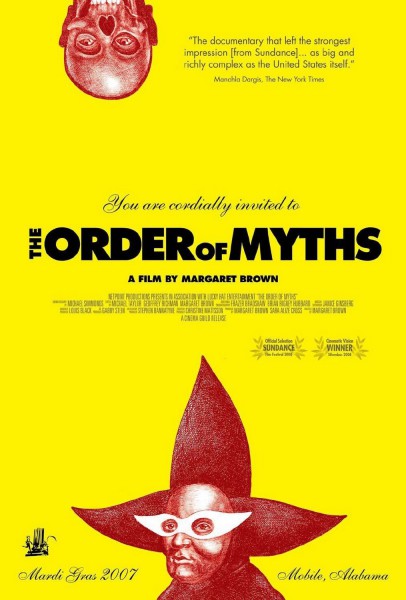
Si vous aimez ce film, faites-le savoir !
- Infos
- Casting
- Infos techniques
- Photos
- Vidéos
- Passages TV
- Citations
- Personnages
- Musique
- Récompenses
Durée 1h19
OrigineEtats-Unis
Genres Documentaire
Themes Le racisme, Documentaire sur la discrimination, Documentaire sur le droit, Documentaire historique, Documentaire sur une personnalité, Documentaire sur la politique, Politique
Note68%










The Order of Myths is a 2008 documentary film directed by Margaret Brown. It focuses on the Mardi Gras celebrations in Mobile, Alabama, the oldest in the United States. It reveals the separate mystic societies established and maintained by black and white groups, and acknowledges the complex racial history of a city with a slaveholding past. While showing the mystic societies' ties to economic, class and racial stratification, the film also showed the beginnings of interaction between the black and white courts. It also tells some of the history of Africatown, a community formed north of Mobile in 1860 by Africans from Ghana, transported illegally as slaves to Mobile decades after the end of the slave trade.
The film competed in the Documentary Competition at the 2008 Sundance Film Festival. It had a limited release in New York on July 25, 2008, and ran on Independent Lens, a PBS series featuring independent films, in 2009. It was distributed by The Cinema Guild.
Commentaires
Postez un commentaire :
Suggestions de films similaires à The Order of Myths
Il y a 8965 ayant les mêmes genres cinématographiques, 10576 films qui ont les mêmes thèmes (dont 50 films qui ont les mêmes 7 thèmes que The Order of Myths), pour avoir au final 70 suggestions de films similaires.Si vous avez aimé The Order of Myths, vous aimerez sûrement les films similaires suivants :
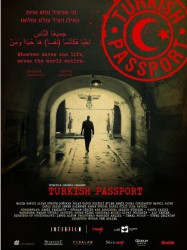
Turkish Passport (2011)
, 1h31Genres Drame, Documentaire, Historique
Thèmes Le racisme, Religion, Documentaire sur la discrimination, Documentaire sur le droit, Documentaire sur la guerre, Documentaire historique, Documentaire sur une personnalité, Documentaire sur la politique, Documentaire sur la religion, Politique, Religion juive, Documentaire sur la Seconde Guerre mondiale
Note79%





Turkish Passport tells the story of diplomats posted to Turkish embassies and consulates in several European countries, who saved numerous Jews during the Second World War. Whether they pulled them out of Nazi concentration camps or took them off the trains that were taking them to the camps, the diplomats, in the end, ensured that the Jews who were Turkish citizens could return to Turkey and thus be saved. Based on the testimonies of witnesses who traveled to Istanbul to find safety, Turkish Passport also uses written historical documents and archive footage to tell this story of rescue and bring to light the events of the time. The diplomats saved not only the lives of Turkish Jews, but also rescued foreign Jews condemned to a certain death by giving them Turkish passports. In this dark period of history, their actions lit the candle of hope and allowed these people to travel to Turkey, where they found light. Through interviews conducted with surviving Jews who had boarded the trains traveling from France to Turkey, and talks with the diplomats and their families who saved their lives, the film demonstrates that "as long as good people are ready to act, evil cannot overcome".
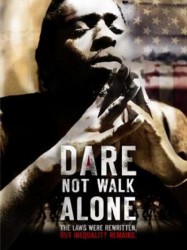
Dare not Walk Alone (2006)
, 1h20Genres Documentaire
Thèmes Le racisme, Documentaire sur la discrimination, Documentaire sur le droit, Documentaire historique, Documentaire sur une personnalité, Documentaire sur la politique, Politique
Note84%






As We Forgive (2008)
Genres Documentaire
Thèmes Afrique post-coloniale, Le racisme, Documentaire sur la discrimination, Documentaire sur le droit, Documentaire sur la guerre, Documentaire historique, Documentaire sur une personnalité, Documentaire sur la politique, Politique
The film tells the story of two Rwandan women who come face-to-face with the neighbors who slaughtered their families during the 1994 genocide, and their personal journeys toward forgiveness. Featuring in-depth interviews with both survivors and murderers, As We Forgive provides an intimate, first-hand view of the encounters between genocide perpetrators and their victims’ families.
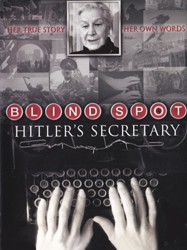 , 1h27
, 1h27Genres Guerre, Documentaire
Thèmes Le racisme, Religion, Documentaire sur la discrimination, Documentaire sur le droit, Documentaire sur la guerre, Documentaire historique, Documentaire sur une personnalité, Documentaire sur la politique, Documentaire sur la religion, Politique, Religion juive, Documentaire sur la Seconde Guerre mondiale
Note72%






4 Little Girls (1997)
, 1h42Réalisé par Spike Lee
Origine Etats-Unis
Genres Documentaire, Historique
Thèmes Le racisme, Le terrorisme, Documentaire sur la discrimination, Documentaire sur le droit, Documentaire sur la guerre, Documentaire historique, Documentaire sur une personnalité, Documentaire sur la politique, Documentaire sur le terrorisme, Politique
Acteurs Ossie Davis, Spike Lee, Bill Cosby, Walter Cronkite
Note77%





Film documentaire, 4 little girls revient sur l'attentat à la bombe dans une église afro-américaine qui, en 1963, tua quatre fillettes âgées de 11 à 14 ans.
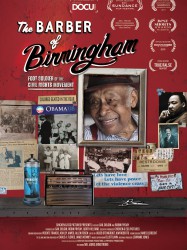
Réalisé par Gail Dolgin
Genres Documentaire, Historique
Thèmes Le racisme, Documentaire sur la discrimination, Documentaire sur le droit, Documentaire sur la guerre, Documentaire historique, Documentaire sur une personnalité, Documentaire sur la politique, Documentaire sur la santé, Politique
Note6%





 , 32minutes
, 32minutesOrigine Etats-Unis
Genres Documentaire
Thèmes Le racisme, Documentaire sur la discrimination, Documentaire sur le droit, Documentaire historique, Documentaire sur une personnalité, Documentaire sur la politique, Politique
Note73%





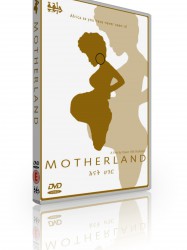
Motherland (2010)
, 1h58Réalisé par Owen 'Alik Shahadah
Origine Etats-Unis
Genres Documentaire
Thèmes Afrique post-coloniale, Esclavagisme, Le racisme, Documentaire sur la discrimination, Documentaire sur le droit, Documentaire historique, Documentaire sur une personnalité, Documentaire sur la politique, Politique
Acteurs Harry Belafonte, Abdulkadir Ahmed Said
Note82%





Motherland is an epic documentary about the African continent from Ancient Egypt to the present. It is an overview of African history and contemporary issues but with the African people at the centre of the story. It is one of the first Pan-African features to be made.

Rwanda pour mémoire (2003)
, 1h8Réalisé par Samba Félix Ndiaye
Origine France
Genres Documentaire
Thèmes Afrique post-coloniale, Film sur un écrivain, Le racisme, Documentaire sur la discrimination, Documentaire sur le droit, Documentaire sur la guerre, Documentaire historique, Documentaire sur une personnalité, Documentaire sur la politique, Politique
Entre avril et juillet 1994, le massacre Tutsis et des Hutus modérés a fait un million de morts. À l’initiative de Fest’Africa, une dizaine d’auteurs africains se sont retrouvés en résidence d’écriture à Kigali, quatre ans après les évènements, cherchant à briser le silence des intellectuels africains sur le génocide.

Sweet Dreams (2012)
, 1h26Réalisé par Lisa Fruchtman
Origine Etats-Unis
Genres Drame, Documentaire, Historique, Musical
Thèmes Afrique post-coloniale, La musique, Le racisme, Documentaire sur la discrimination, Documentaire sur le droit, Documentaire sur la guerre, Documentaire historique, Documentaire sur la musique, Documentaire sur une personnalité, Documentaire sur la politique, Musique, Politique
Note76%





 Connexion
Connexion